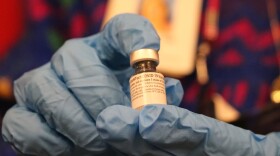Researchers at the University of Arkansas for Medical Sciences are studying ways to help protect the heart health of cancer patients from chemotherapy side effects. Dr. Hui-Ming Chang is leading the study, which will be the first Phase 1 cancer clinical trial done at UAMS.
The study aims to limit the heart damage caused by a commonly used chemotherapy drug known as doxorubicin. Chang says the negative effects of the drug sometimes aren’t felt until well after cancer treatment has ended.
“So your cancer is cured, and some years later you all of a sudden found you’re kind of puffing a bit, your heart’s not having as much reserve as other people,” Chang said.
Chang’s study involves another drug called dexrazoxane which has been approved by the U.S. Food and Drug Administration to help limit heart damage, but can limit the efficacy of chemotherapy. She says that’s caused dexrazoxane to only be commonly used with very high doses of chemotherapy drugs.
“So based on that, we designed this, ‘How about we just give dexrazoxane first?’ And… we see that in cell lines in animals, in two hours it’s degraded and they will recover in about 48 hours. And that’s a window of opportunity when we can give doxorubicin,” Chang said.
By giving the drug eight hours before a chemotherapy treatment, she says it will specifically target certain enzymes that protect the heart while not producing enzymes that interfere with chemotherapy.
“Sometimes when people hear ‘Oh, it may hamper the chemotherapy drugs’ efficacy,’ and then people are kind of just scared and stay away. It’s a conceptual thing,” Chang said.
Chang says the first phase of her trial involves giving healthy women aged 18 to 65 a single dose of dexrazoxane and studying the drug’s behavior in humans. She says the second phase of the trial will study the drug’s impact on heart health in 120 breast cancer patients undergoing treatment with doxorubicin.
Chang’s study, called Phoenix 1, is funded through a $3.5 million grant from the National Institutes of Health. Women interested in volunteering for the study can email phoenix1@uams.edu.






